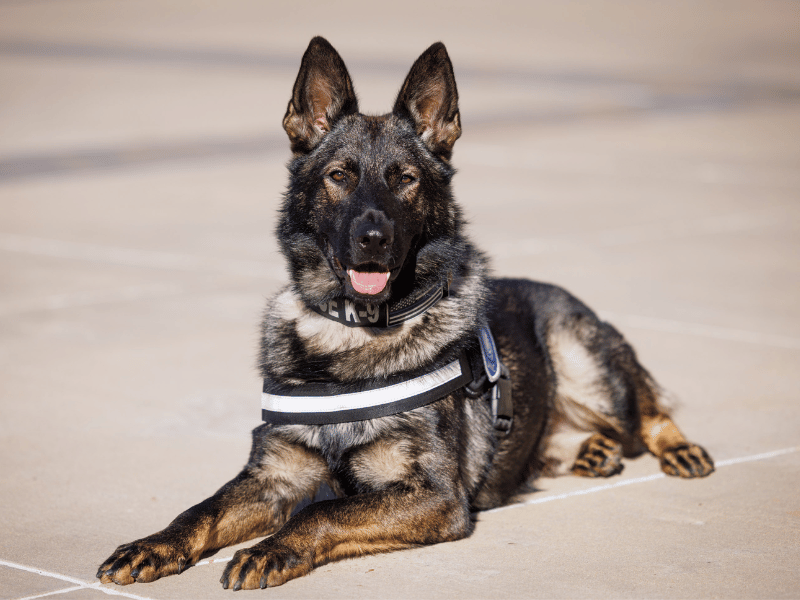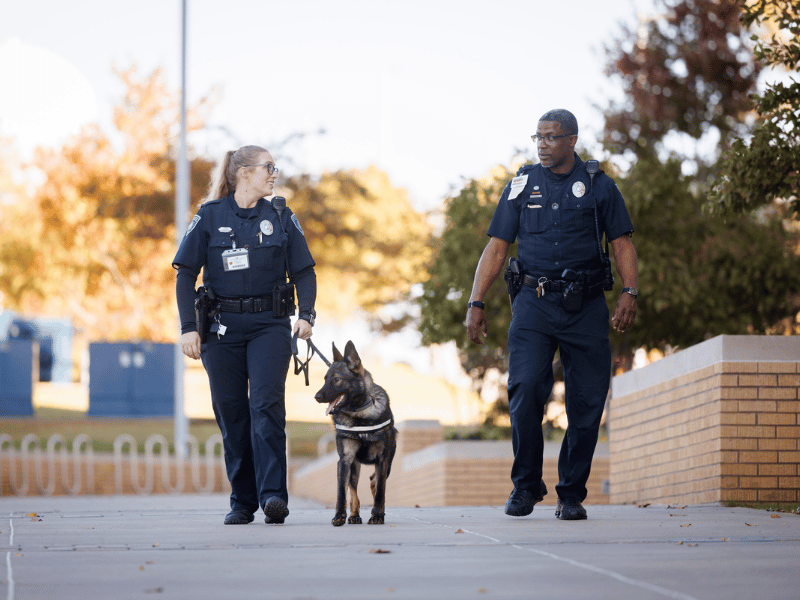UMMC PD puts Law on its side

The UMMC Police and Public Safety Department welcomed the Law to campus last week – not for an emergency, but to enjoy and employ a furry new friend.
Law, a 1-year-old German Shepherd bred in Poland, joined the force as a one-dog explosives-sniffing dynamo. Officer Christie Shoemaker doubles as trainer and companion for the cuddly canine.
“Dogs can do a lot for us,” Shoemaker said. “Their olfactory system is a lot stronger than ours is as humans. They can deter crime in a way humans can’t. And they can bring people together.”
As with most police dogs, Law has a nose that can detect 18 distinctive odors associated with highly explosive material that humans can’t smell, Shoemaker said.

“He can smell things like TNT, nitromethane, ammonium perchlorate, certain plastic explosives, detonation cords and safety cords,” she said. “These odors are much harder to detect than drugs like marijuana and cocaine. Those are easier to find because the odor expands in the air in a way that can take over a whole car. With explosive odors, they sit in the air real light. They don’t expand out like drugs do.”
Law will spend his days doing specific checks and walk-throughs with Shoemaker, plus occasional visits with patients at Children’s of Mississippi. “He’ll help brighten someone’s day there, as he already brightens ours.”
Shoemaker, a Navy veteran, was hired in August to handle Law after having worked previously with K9 units sniffing out illegal narcotics with the Flora Police Department. She earned a Narcotics and Apprehension K9 trainer’s certificate from Little Rock K9 Academy and continues training in explosives detection and with local police departments.
“My last dog was narcotics and apprehension, so this is a different area of K9 expertise,” she said. “All his commands were in German, so it’s been an adjustment for me. But, having the working dogs’ commands in another language keeps the dog from getting confused. I’m excited to be part of it.”
Dr. Jonathan Wilson, chief administrative officer, said the public has seen the serious impacts a bomb threat or a suspicious package can have on college campuses or busy office buildings.

“We don’t have the simplicity of evacuating our hospitals to clear the building, we had to find another solution. Law gives us the ability to keep our campus community safe while allowing us the ability to maintain critical operations. Having the unit enables the department to seek grants to expand it to other specialty dogs, such as for narcotics or crisis response,” he said.
UMMC Police Chief Mary Paradis said Law expands the department’s services to the UMMC community.
“I was searching for an ambassador for my department and, as a lifelong dog lover, I recognize dogs are often able to break down barriers that may exist between officers and citizens and can serve as an excellent conversation piece. Don’t be surprised if you see me riding shotgun-style with Officer Shoemaker to calls for service – I cannot get enough of this adorable little dude,” she said
Law will also be at officers’ sides when partnering with other law enforcement agencies in the community.
“Shepherds are very loyal and are pleasing to their handlers and can bring agencies together, too,” Shoemaker said. “It’s what makes them such great pets at home. And he still likes to play as a puppy, so working K9 unit dogs have no regard for their own self-preservation – but that’s where handlers come in, to help them.”
In Law’s case, he sees the same handler even when it’s time to indulge in some tasty vittles, then roll over and sleep for the night.
“He goes home with me, I feed him, I walk him, I play with him,” she said. “He sleeps in another room in a kennel. But, they can put some weight on quickly.
“If we get a second one, we’ll want to name him Order,” she said.


